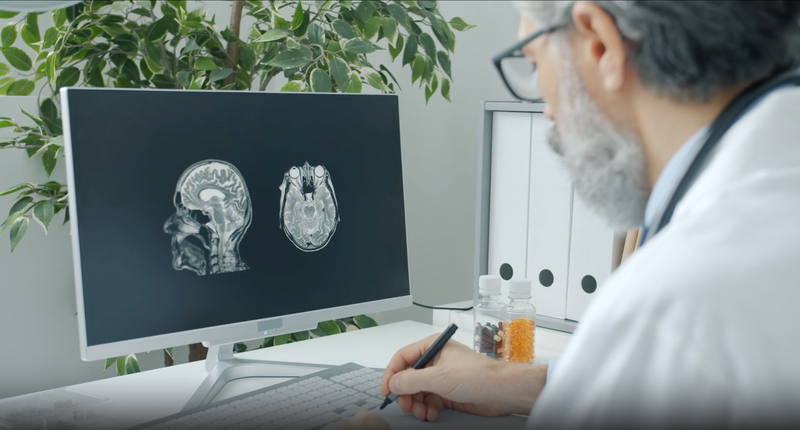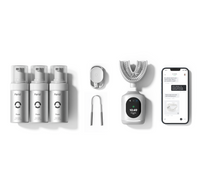
12 min read
Why Oral Hygiene Is More Than Just a Smile: Understanding Whole-Body Health
Oral hygiene is not just about keeping your teeth sparkly white; it's a crucial component of your overall health. The problems in your mouth can affect the rest of your body. The idea that your oral health is connected to your overall health is not new, but the depth of this connection is only now being fully understood. This understanding highlights the importance of maintaining good oral health not just for a beautiful smile but for maintaining your overall well-being.
The Mouth-Body Connection
How Oral Health Impacts Systemic Conditions
The mouth-body connection concept emphasizes that oral health is intricately linked to various systemic conditions. Bacteria from the mouth can enter the bloodstream and cause infections and inflammations in distant body parts. Individuals with periodontal disease, an infection of the gums, are more likely to develop cardiovascular diseases, among other health issues. This shows how the health of our mouth can have far-reaching consequences on our overall health status.
Links Between Gum Disease and Chronic Inflammation
Gum disease is not just a leading cause of tooth loss; it is also associated with increased levels of chronic inflammation throughout the body. Chronic inflammation is a known risk factor for many serious health conditions, including heart disease, diabetes, and arthritis. Managing gum health could be a key strategy for preserving oral health, controlling inflammation, and reducing the risk of these conditions.
Oral Hygiene and Heart Health
There is a significant relationship between oral hygiene and heart health. Poor oral health, characterized by gum disease, can lead to an increased risk of heart disease. The bacteria that cause gum inflammation can travel through the bloodstream, leading to plaque buildup in the arteries, a major risk factor for heart disease. Such a connection highlights the need for consistent oral care practices to prevent these serious health outcomes.
The Role of Oral Health in Diabetes
Poor oral health is a known complicator for diabetes management. Infections such as periodontitis can hinder the body's ability to utilize insulin, complicating blood sugar control, which is crucial for diabetic patients. A healthy mouth contributes to a robust immune system. Persistent oral infections can weaken the immune system, making it harder to fight off other illnesses. Maintaining oral health is vital for enhancing immune response and managing diabetes effectively.

The Importance of Preventing Gum Disease
What is Gum Disease, and Why is it Harmful?
It's typically caused by poor brushing and flossing habits that allow plaque—a sticky form of bacteria—to build up on the teeth and harden. In advanced stages, periodontal disease can lead to sore, bleeding gums, painful chewing problems, and even tooth loss. Beyond these oral complications, it can also have serious implications for your systemic health, making it a critical health issue to manage.
Signs of Gum Disease and How to Address Them Early
Being vigilant about early symptoms allows for timely intervention, which can reverse the condition or prevent its progression. Below is an exploration of the key signs of gum disease and strategies to address them effectively:
- Red, Swollen, or Tender Gums: One of the earliest and most noticeable signs of gum disease is inflammation, leading to gums that appear red, swollen, or tender. This occurs due to the immune system’s response to bacteria buildup along the gum line, often triggered by poor oral hygiene or irregular cleaning. Ignoring this sign can result in the condition worsening into gingivitis or even periodontal disease. Addressing this early involves improving oral care routines, such as brushing twice daily with a soft-bristled toothbrush and flossing regularly to remove plaque. Using an antibacterial mouthwash can also help reduce bacteria and soothe irritation. Consulting a dentist promptly ensures a professional cleaning or deeper intervention if needed, stopping the disease before it progresses further.
- Bleeding While Brushing or Flossing: Healthy gums should not bleed during routine brushing or flossing. Bleeding gums often indicate that plaque and tartar have irritated the gum tissue, leading to inflammation. This is a clear early warning sign of gum disease, typically linked to gingivitis. To address this, maintain a consistent and thorough oral hygiene routine. Switching to a softer toothbrush and ensuring proper brushing technique can minimize irritation while cleaning effectively. Incorporating flossing and mouthwash into daily habits further reduces plaque buildup.
- Persistent Bad Breath: Chronic bad breath, or halitosis, can be caused by the bacteria thriving in infected gum tissues. This unpleasant symptom is often one of the first indicators of gum disease, signaling the presence of decay or infection beneath the gum line. To combat bad breath, enhance oral hygiene by brushing the tongue and using mouthwash in addition to brushing and flossing. Staying hydrated also helps keep bacteria in check by promoting saliva production, which naturally cleanses the mouth. However, persistent bad breath, despite these efforts, requires professional attention. A dentist can thoroughly clean to remove hidden bacteria and plaque while identifying and treating any underlying issues contributing to the odor.
- Receding Gums: Receding gums can also increase sensitivity to temperature changes and make teeth appear longer than usual. This occurs as the infection destroys the tissue supporting the teeth, leading to structural changes in the gum line. Early intervention is critical to prevent further damage. Treatment often includes scaling and root planing, a deep cleaning procedure that removes tartar and bacteria below the gumline. In severe cases, surgical options like gum grafting may be necessary. To prevent receding gums, focus on gentle brushing techniques and avoid aggressive cleaning habits that can exacerbate tissue loss.
- Loose Teeth: Loose teeth are a sign that gum disease has progressed significantly, affecting the bones and ligaments that support the teeth. This symptom often indicates periodontitis, the advanced stage of gum disease where the underlying structures are compromised. Immediate action is required to prevent tooth loss. Dentists may recommend scaling and root planing or even surgical procedures to stabilize the teeth and restore gum health. Strengthening oral hygiene practices and addressing contributing factors like smoking or poor diet can also help halt the progression of the disease.
Early intervention not only protects your teeth and gums but also supports your overall health, as untreated gum disease has been linked to conditions such as heart disease and diabetes. Regular dental checkups and a commitment to oral care ensure a healthy smile and long-term wellness.
Innovative Approaches to Oral Hygiene
Benefits of Advanced Tools
The introduction of u-toothbrushes marks a significant innovation in oral hygiene tools. These devices are designed to clean all teeth simultaneously, using a mouthpiece fitted with bristles that cover each tooth's surface. This design ensures comprehensive cleaning in a fraction of the time it takes with traditional toothbrushes. By providing uniform pressure across all teeth, these toothbrushes can prevent areas of neglect and reduce the risk of gum disease and tooth decay, making them a beneficial tool for daily dental care. Full-mouth toothbrushes offer a holistic cleaning experience by targeting every tooth and the surrounding gum line within seconds. This technology is not only time-efficient but also extremely effective in reducing plaque build-up and maintaining gum health.

The Role of Technology
Advancements in technology have led to the development of more precise and effective dental care tools. These innovations include electric toothbrushes with pressure sensors, water flossers, and interactive dental health apps that help track hygiene habits and offer personalized guidance. These tools make it easier to maintain optimal dental care, encouraging consistency and thoroughness in daily routines, which is crucial for preventing disease and promoting long-term oral health.
Practical Tips for Enhancing Your Daily Dental Routine
Enhancing your daily dental routine is one of the simplest yet most effective ways to maintain excellent oral health and prevent dental issues. Small, consistent changes in your habits can have a significant impact on your smile and overall health. Here’s a dive into practical tips that can improve your oral hygiene practices:
- Choose the Right Tools: Selecting the right dental tools is fundamental to effective oral care. High-quality toothbrushes are designed to cover more surface area and provide a thorough cleaning experience. These advanced tools are especially beneficial for individuals who struggle to reach certain areas of their mouths. Pairing them with electric toothbrushes enhances cleaning precision by offering consistent pressure and motion. investing in tools like interdental brushes and tongue scrapers can help clean areas that regular brushes might miss. The right tools not only improve cleaning efficiency but also make the routine more enjoyable, encouraging consistency in your daily care.
- Timing Your Brushing: Brushing for the proper amount of time is a key element of a good dental routine. The American Dental Association recommends brushing for at least two minutes twice a day. To ensure you meet this standard, use a timer or an electric toothbrush with a built-in timer that signals when to move to the next section of your mouth. Proper timing ensures that plaque and food particles are effectively removed, reducing the risk of cavities and gum disease. Brushing too quickly can leave areas uncleaned while brushing for too long with excessive pressure can damage enamel. Establishing this habit ensures a balanced and comprehensive cleaning for healthier teeth and gums.
- Floss Regularly: Flossing is an often-overlooked but essential step in oral hygiene. It removes food particles and plaque from between teeth and along the gumline, areas that toothbrushes can’t reach. Skipping flossing allows bacteria to build up in these spaces, increasing the risk of gum disease and cavities. Regular flossing, ideally once a day, disrupts plaque development and maintains gum health. For those who find traditional floss challenging, tools like water flossers or pre-threaded floss picks can make the process more convenient.
- Use Fluoride Toothpaste: Fluoride is a powerful agent in preventing tooth decay and strengthening enamel. Using fluoride toothpaste as part of your brushing routine helps to remineralize weakened enamel, protecting it against acid attacks from food and beverages. Fluoride reduces the growth of harmful bacteria that cause cavities. For individuals with specific concerns like sensitivity or advanced decay, toothpaste formulations with higher fluoride concentrations may be recommended by dentists. Consistently using fluoride toothpaste is a simple yet effective way to reinforce your teeth’s natural defenses against decay and erosion.
- Rinse with an Antiseptic Mouthwash: Incorporating an antiseptic mouthwash into your daily routine can provide an additional layer of protection. Mouthwash helps kill bacteria, reduce plaque, and freshens breath, complementing brushing and flossing. It can reach areas of the mouth that are harder to clean, such as the back of the throat or between tightly spaced teeth. For best results, choose a mouthwash that contains antibacterial agents and fluoride. Swishing for the recommended amount of time ensures optimal benefits. Mouthwash is particularly helpful for individuals with braces, implants, or other dental appliances that make thorough cleaning challenging.
- Change Your Toothbrush Regularly: Replacing your mouth-shaped toothbrush or the head of an electric toothbrush every three to four months ensures that the tool continues to clean effectively. Damaged bristles can fail to remove plaque properly and may even harm your gums. It’s also important to replace your toothbrush sooner if you’ve been sick, as bacteria and viruses can linger on the bristles. Keeping your toothbrush fresh ensures that your oral hygiene routine remains efficient and safe.
- Eat a Mouth-Healthy Diet: Your diet significantly impacts your oral health. Reducing sugar intake minimizes the food source for harmful bacteria that cause cavities. Incorporating foods that promote saliva production, such as crunchy fruits and vegetables like apples and carrots, helps naturally clean your teeth and neutralize acids. Dairy products, rich in calcium and phosphorus, strengthen enamel, while green tea contains antioxidants that reduce inflammation in the gums. A balanced diet not only benefits your teeth but also contributes to overall well-being, reinforcing the connection between nutrition and oral health.
- Stay Hydrated: Drinking water throughout the day helps wash away food particles and bacteria, maintaining a clean and moist environment in your mouth. Saliva, which is mostly water, plays a crucial role in neutralizing acids and preventing dry mouth, a condition that can lead to bad breath and tooth decay. Choosing water over sugary or acidic beverages like soda and juice further protects your enamel and reduces the risk of cavities. Staying hydrated is a simple yet effective way to support oral health and wellness.
By incorporating these practical tips into your daily dental routine, you can ensure a lifetime of healthy teeth and gums. Consistency and attention to detail are key, and combining these strategies with regular dental visits will help you maintain optimal oral hygiene and overall wellness.

The importance of oral hygiene extends far beyond maintaining a bright smile; it is vital for whole-body health. There is a deep interconnection between a healthy mouth and various aspects of systemic health, from reducing the risk of chronic diseases to enhancing immune function. Oral health and overall health are profoundly intertwined, emphasizing that proper dental care is essential not only for preventing oral diseases but also for supporting lifelong health and wellness.
Share




